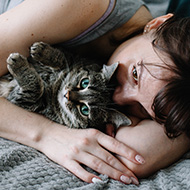
Cats Protection reports a stark increase in referrals across the southeast.
Leading feline charity Cats Protection has reported a 58 per cent rise in pets being referred so their owners can flee domestic abuse.
The concerning figure comes just days after Dogs Trust also revealed a sharp increase in dogs being referred to its specialist abuse service.
Working in partnership across the southeast, Cats Protection’s Paws Protect and Dogs Trust’s Freedom Project have collectively fostered 1,930 pets since 2004.
However, both charities say they require more foster carers to help domestic abuse victims and their pets.
Amy Hyde, Paws Protect manager said: “We know just how important it is for survivors to ensure that their cats will also be safe when they access refuge or emergency housing. The bond that we have with our cats is so important and sadly this can be exploited by perpetrators, with many pets physically harmed or threatened with abuse as a tool to coerce and control.
“If you might be able to offer a foster home to a cat escaping domestic abuse, please get in touch. Your support could mean that you’re not only helping a cat, but you’re also supporting a family to find safety too”.
Cats Protection's findings mark the start of 16 Days of Activism Against Gender-Based Violence - an international campaign calling for the prevention and elimination of violence against women and girls.
Amy continued: "We are proud to support this 16 days of action against gender-based violence. Already, Paws Protect has supported over 1,000 cats and their families in escaping domestic abuse. Those aren’t just numbers. They are families who were able to find safety and were able to rebuild their lives with their animals.”
For more information on the service and to become a fosterer, visit cats.org.uk/paws-protect, email pawsprotect@cats.org.uk or call 0345 260 1280.



 The veterinary mental health charity Vetlife is inviting the veterinary community to join it for a sponsored cold-water dip.
The veterinary mental health charity Vetlife is inviting the veterinary community to join it for a sponsored cold-water dip.